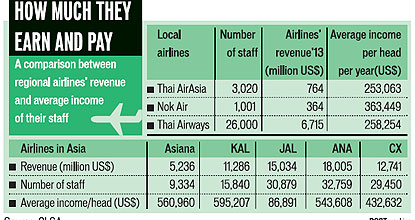
During dinner with Bangkok Post reporters in May 2001, Thaksin Shinawatra, then prime minister, said Thai Airways International's service "sucked" and if he were not a public figure, he would not fly with the national carrier.

Since then, Mr Thaksin has sent his aides to sit on THAI's board and high-ranking executives to control the airline's decision-making process in all areas including opening new routes and buying new aeroplanes.
British consultancy Skytrax, based on a global passenger survey, named THAI as the second-best airline in the world in 2007. But THAI slipped to ninth in 2012 and out of the top 10 in 2013, while its main rival, Singapore Airlines, was successful in keeping its place in the top three from 2000-13.
THAI's executives, however, blamed miscoordination between the airline and Skytrax for its failure to secure a top-10 ranking in 2013, not its falling service quality.
"It is normal practice for operators to push their airlines to rank in the top 10 because the ranking has influence over passengers' confidence, but I consider financial performance or profit as the ultimate goal, and several times there has been a negative correlation," Chokchai Panyayong, acting president and senior executive vice-president of THAI, told Forbes Thailand magazine.
However, THAI cannot show anyone that it has delivered solid earnings. In the 50 years since it was incorporated, it has been the subject of allegations that politicians, civil servants and the Royal Thai Air Force have taken advantage of the airline.
Over the past decade, THAI has been steered by four presidents and has suffered hefty losses in three of the last 10 years, though all of its competitors have enjoyed profits.
The massive net losses of 10.19 billion baht in 2011 and 12.05 billion baht in 2013 emerged during the five-year chairmanship of secretary-general to the cabinet Ampon Kittiampon, while rumours have continued to escalate that the carrier is a big source of benefits for politicians, management and staff.
Most securities analysts forecast that 2014 will be another loss-making year for THAI as domestic political upheaval has taken a toll on passenger numbers, price-cutting competition with budget airlines and Middle East airlines has intensified, and the carrier is required to continue an impairment exercise on its ageing aircraft.
Analysts estimate THAI will record a net loss in a range of 2.62 to 9.1 billion baht this year. According to www.settrade.com, half of 10 analysts recommended selling the airline's stock.
Former THAI president Piyasvasti Amranand told Forbes Thailand that THAI has made late adjustments amid the growing challenges from low-cost airlines and cash-rich Middle East airlines, while its state enterprise status has brought constraints.
"When the global wave changed, THAI seemed to fail to adjust itself and this is blunting the airline's competitiveness," he said.
Read the cover story about THAI in Forbes Thailand.